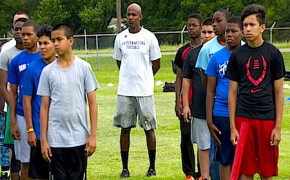Let's Start With Respect

Students in the Dallas Champions Academy stand at attention while being taught the importance of respecting, flag, veterans and country.
“Look at me when I’m talking to you.
Sit up straight.
Say your name with pride, when you introduce yourself, don’t mumble it.
Look at me son. I’m not mad at you, I’m trying to help you succeed.”
These tough-love words are repeated over and over again during the four days of Dallas Champions Academy, by Coach Bob Fello, a gruff but lovable former defensive coach at Kansas State University who spends his summer, along with a team of others, working with at-risk children in the hopes of getting them into college.
The academy is a nationwide program, which includes a stop in Dallas, and is led by current and former college football coaches and teachers from throughout the nation. The four-day camp packs a punch in terms of influencing about 200 youth in a deep poverty pocket of South Dallas. The kids get a hearty dose of academics, goal setting, athletics, character development, life skills, nutrition and Christian formation. Basically, the academy team tells youth ages 8-18 that they can achieve their dreams with the mantra of discipline, respect, trust and hard work. They get them to believe in themselves so they can believe that college is possible and they can break the cycle of poverty in their families.
Many of these kids don’t see their futures going beyond their own neighborhoods, said Rhonda Smith, who is a teacher in the program. “We try to help them believe that whatever they want to accomplish, they can get there,” she said. “The biggest thing we see is that they don’t believe they are important enough for adults to take an interest in them. Their parents are busy trying to put food on the table. Someone has to say, ‘you are worth my time.’ Kids are malleable, and we need to build them up.”
Each camp starts with these words: “God does not make junk. He made you for a purpose. We are here to help you find that purpose,” Ken Heupel, who is president of the program, and former head football coach for Northern State University, tells each group of boys and girls.
The Dallas academy is funded by a variety of donations and sponsors. The Episcopal Diocese of Dallas partially funded the program this year, and Bishop George Sumner served as co-chairman along with Bishop J. Lee Slater from New Millenium Bible Fellowship. Carrie Headington, evangelist for the diocese helped bring the Champions Academy to Dallas seven years ago and has served on its leadership team every year.
“This Dallas Champions Academy has served as a catalyst to bring together churches across racial, economic, and denominational lines in an effort to help South Dallas youth know their value and know how loved they are by God,” Headington said. “We’ve all grieved the recent events in our country. This is a powerful way to unite as a city and help our boys and girls achieve their dreams. It changes lives. It changes families. It changes communities.”
The coaches show the children what self-confidence looks like, physically, by instructing them to make eye contact with people they are talking to, stand tall, shake hands with confidence and introduce themselves with pride. “We tell them, ‘be proud of yourself. Sit in front of the class,’” said Coach Allen Wilbon, who coaches at Eastern Arizona College. “Be a leader, and be confident. If you want to be successful, this is what you have to do. Have that hope and speak it into existence. Whatever you want to do in life – go for it. Do it. Work hard and keep at it.”
During the camp, Wilbon talked to the youth about bullying and how to appropriately speak up about it on behalf of others and themselves. There is also a hearty dose of Christian values added to the program. “We talk about Jesus Christ, and we talk about prayer with the kids and have devotionals,” Wilbon said. “We help each other get better and we help each other grow.”
The children also get plenty of exercise during the camp days with running, stretching, calisthenics and games. The coaches keep an eye out for potential football standouts, which is a vehicle to get them into college. “We could not care less whether they play football,” said Justin Iske, who is a football coach at Southwestern Oklahoma. “We just want them in school.”
At the end of the four days, one of the girls told the coaches she used to cut herself to make her feel better about the pain she was experiencing in her home life. She had no confidence and was depressed. After a few years of attending the camp, she turned her young life around and achieved her dreams of playing softball, getting good grades and becoming a cheerleader at her school.
Program leaders estimate that 67 percent of the students go to college, and about 70 percent of number graduate. The best way to get them into college is telling they can do it, and then giving them life skills to handle roadblocks, Fello said. “They need to know that they are going to fail, but it’s OK, they can get past it and keep going toward their goal.” Failure doesn’t mean it’s a deal-breaker, it just means there is a hurdle.
“Everybody has a story. If it’s a bad story, make sure that’s not the ending,” Fello said. “The goal is to multiply the healthy families. That changes everything.”

